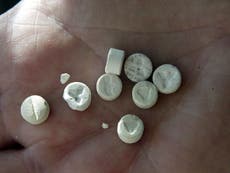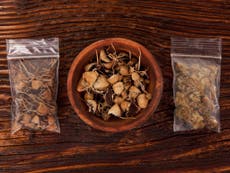Psychedelic drug DMT to undergo first clinical trial to treat depression
The drug is known as the ‘spirit molecule’

Your support helps us to tell the story
From reproductive rights to climate change to Big Tech, The Independent is on the ground when the story is developing. Whether it's investigating the financials of Elon Musk's pro-Trump PAC or producing our latest documentary, 'The A Word', which shines a light on the American women fighting for reproductive rights, we know how important it is to parse out the facts from the messaging.
At such a critical moment in US history, we need reporters on the ground. Your donation allows us to keep sending journalists to speak to both sides of the story.
The Independent is trusted by Americans across the entire political spectrum. And unlike many other quality news outlets, we choose not to lock Americans out of our reporting and analysis with paywalls. We believe quality journalism should be available to everyone, paid for by those who can afford it.
Your support makes all the difference.In the first study of its kind, UK regulators have given the drug dimethyltriptamine (DMT) the green light for a clinical trial into its effectiveness in treating patients with depression.
The hallucinogenic compound, which has been called the “spirit molecule," is known for inducing powerful trips. It is one of the main active ingredients in ayahuasca, a South American brew used in shamanistic rites, and can be found in several plants.
The drug produces hallucinations and distortions of time, space, sound and colour in the user, but these effects are are short-lived compared to those of other psychedelics like LSD and magic mushrooms, which tend to last for several hours.
The trial will be run by the Centre for Psychedelic Research at Imperial College London in collaboration with a neuropharmaceutical company called Small Pharma, who described the approval as a “truly ground-breaking moment” in the treatment of depression.
“Psychedelic assisted therapy will revolutionise the treatment of depression because it gets right to the root cause of the illness,” Carol Routledge, chief medical and scientific officer at Small Pharma told The Independent.
She described the DMT psychedelic experience as being “like shaking up a snow globe” in the brain. By disrupting unhealthy patterns of thought, the experience provides opportunity for them to “resettle” in a different way, helping the patient to then benefit much more from the psychotherapy that accompanies the drug’s administration.
In contrast, other antidepressant treatments “dampen symptoms rather than getting to the root cause”, Dr Routledge said.
The trial will initially see healthy participants given the drug, but is expected to be followed by a second study of volunteers with depression, who would also receive psychotherapy counselling.
Dr Routledge described the regulatory approval as “a truly ground-breaking moment in the race to effectively and safely treat depression, as more and more people suffer as a result of the pandemic”.
DMT can deliver a psychedelic experience in 20 mins, according to Small Pharma CEO Peter Rands, as well as having other “unique properties that lend itself to clinical use”. The naturally occurring compound has a similar pharmacological structure to psilocybin – found in magic mushrooms – and LSD.
The drug is a controlled substance, classified as a class A drug and carrying a maximum penalty of seven years in prison for possession and life imprisonment for supply. This means the Home Office must also give permission for the trial to go ahead, after the Medicines and Healthcare products Regulatory Agency (MHRA) gave the green light on Monday.
The neuropharmaceutical hopes the trial will change minds about the potential of “once stigmatised compounds” as useful medical therapies.
“By adopting responsible evidence-based research and development into psychedelic medicine, we hope to help rebrand these once stigmatised compounds as highly effective medical therapies which can be integrated into current healthcare systems and made accessible to the millions of people suffering from depression,” Mr Rands said in a statement.
The team hope to begin the first trial January 2021.
It follows research that has observed positive and long-lasting results in the mental health of volunteers using psilocybin. In January, a study found that a single dose of psilocybin can result in “significant improvements” in reducing stress and anxiety in cancer patients for as long as five years after it was administered.
“Participants overwhelmingly (71 to 100 per cent) attributed positive life changes to the psilocybin-assisted therapy experience and rated it among the most personally meaningful and spiritually significant experiences of their lives,” the researchers said.
The regulator’s approval also follows a report from the neoliberal think tank the Adam Smith Institute in July which urged the government to relax restrictions on psilocybin to allow more research into whether the substance could be used to treat depression.





Join our commenting forum
Join thought-provoking conversations, follow other Independent readers and see their replies
Comments